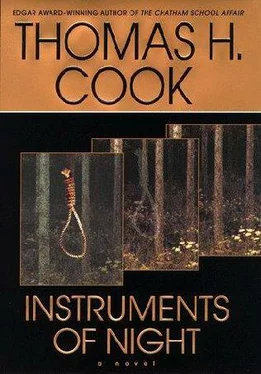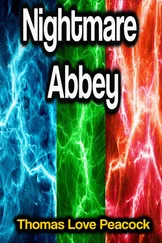Thomas Cook - Instruments of Night
Здесь есть возможность читать онлайн «Thomas Cook - Instruments of Night» весь текст электронной книги совершенно бесплатно (целиком полную версию без сокращений). В некоторых случаях можно слушать аудио, скачать через торрент в формате fb2 и присутствует краткое содержание. Жанр: Триллер, на английском языке. Описание произведения, (предисловие) а так же отзывы посетителей доступны на портале библиотеки ЛибКат.
- Название:Instruments of Night
- Автор:
- Жанр:
- Год:неизвестен
- ISBN:нет данных
- Рейтинг книги:3 / 5. Голосов: 1
-
Избранное:Добавить в избранное
- Отзывы:
-
Ваша оценка:
- 60
- 1
- 2
- 3
- 4
- 5
Instruments of Night: краткое содержание, описание и аннотация
Предлагаем к чтению аннотацию, описание, краткое содержание или предисловие (зависит от того, что написал сам автор книги «Instruments of Night»). Если вы не нашли необходимую информацию о книге — напишите в комментариях, мы постараемся отыскать её.
Instruments of Night — читать онлайн бесплатно полную книгу (весь текст) целиком
Ниже представлен текст книги, разбитый по страницам. Система сохранения места последней прочитанной страницы, позволяет с удобством читать онлайн бесплатно книгу «Instruments of Night», без необходимости каждый раз заново искать на чём Вы остановились. Поставьте закладку, и сможете в любой момент перейти на страницу, на которой закончили чтение.
Интервал:
Закладка:
He evaluated this idea for a moment, trying to recall if he’d ever used it. Various scenes of physical peril raced through his mind, tight spots he’d put Slovak in, then saved him from at the last minute. In The Prey of Chance, Slovak had hurled himself onto a passing coal barge. In The Secrets of the Chamber, he’d leaped in the path of an oncoming train, then scrambled out of harm’s way, leaving Kessler standing on the deserted rails, a thin, bemused smile playing on his lips.
But Slovak had been younger then, vastly more agile, emboldened by a sense of his own invulnerability. In those earlier, less disillusioned days, he’d wanted to live, had expected his wife to live, had envisioned their growing old together, enjoying the comfort of their final days. His life had seemed to have a determined and authentic course then, a perceivable direction. He’d felt worthwhile, his work a mission, Kessler’s recent escapes not yet a prelude to a life of failure.
But Slovak was middle-aged now, Graves thought, childless and alone, his body heavy, earthbound, a sack of flesh and blood, his mind continually racked by hideous images and chilling screams. Watching him as he faced Kessler, Graves wondered how all this might now affect his judgment, in what grim direction it might tend his increasingly tortured mind. Had he grown so tired of life that it would prevent him from seeing an opportunity for escape even if one presented itself? Graves imagined a rag man’s wagon as it passed along the street just below, saw Slovak realize that its high mound of clothing would surely break his fall, and yet, for all that, not jump.
Graves shook his head. That Slovak might make no attempt to save himself was a possibility he could not allow. Slovak must be saved. But only within the parameters of his character. His escape had to be natural, something utterly in line with his inner life and personality, a way out that Slovak would recognize, seize, successfully accomplish. It was Graves’ task to find it. And so he remained at his desk, staring at the same page, trying to find the one solution that would perfectly fit Slovak’s deeply imperfect life.
But as the minutes passed, no escape route emerged. He got to his feet, stretched, and walked out onto the terrace. The bright afternoon sun warmed him, turning his mind away from the narrow ledge upon which he’d once again abandoned Slovak and toward the place from which he’d just returned, the mansion with its spacious lawn, and where he now imagined two teenage girls making their way toward the woods, one dissolving as they neared the trees, the other vanishing into the forest’s strangely watery depths.
He looked back into the cluttered living room of his apartment. The envelope Allison Davies had sent him lay on the small glass coffee table where he’d tossed it. Walking back inside the apartment, he picked up the envelope and opened it. Inside, he found seven photographs. Each was dated and identified.
The first showed two girls as they sat together at the top of a wide flight of wooden stairs. Allison Davies wore a white blouse and black shorts. She was quite slender, with bony knees, her dark hair cut bluntly in a Dutch-boy style. Faye Harrison wore denim shorts and a polo shirt. She had very light hair, probably blond, and it fell in thick waves to her shoulders.
But as Graves observed, these physical differences were only minor compared to the far more profound ones he saw in the teenagers. For while Allison appeared to slink away from the camera, Faye faced it squarely, as if daring it to do her harm. There was a keenness in her eyes, a forthrightness and candor that made Allison seem shy and secretive by comparison. It was a difference that suggested the nature of the friendship, Graves thought. The girls had come together through the peculiar attraction two contradictory natures often have for each other, each possessing exactly, and in perfect proportion, what the other lacked.
In the second photograph, Faye and Allison stand together on a wooden pier, both in swimsuits, Faye bareheaded, Allison with a rubber bathing cap. A circular pond stretches out behind them and Graves instantly imagined them turning from the camera and diving into the water’s welcoming coolness. He studied the photograph, his mind taking in the small boathouse at the other side of the pond, the mansion that loomed majestically beyond it, the empty tennis court, a world whose physical characteristics seemed hardly to have changed since June 1946, when the picture had been taken.
In the third photograph, the girls stand amid a throng of people. A large striped tent rises over a neatly pruned lawn. There are tables covered with white tablecloths, crowded with plates of food and dotted with small American flags. Faye and Allison are posed before the gazebo, its wooden trellises hung in roses, the rear of the mansion like a great wall behind it. Faye’s left arm rests firmly across Allison’s shoulder, drawing her in a posture that struck Graves as curiously protective.
Four other photographs followed. In the first of them Faye and Allison sit in the tennis court, both in obligatory white shorts and blouses, though only Faye holds a racket. In another, Faye pushes a swing forward with what appears great force, her long blond hair flying wildly behind her. Although the face of the girl in the swing is blurred, Allison’s distinctive Dutch-boy haircut is visible nonetheless.
In the next, the girls are once again on the pond, Allison slender, almost delicate, Faye’s body noticeably fuller and more mature, her features caught in a beauty that struck Graves as utterly frank and open. Allison faces the camera from the far end of a small rowboat, her hand lifted in a wave. Faye sits at the near end, her body turned to the right, so that only her profile is visible. She seems to stare toward the pond’s eastern bank, the great house that looms beyond it, her eyes fixed on its grand facade in a gaze of such naturalness and sense of trust that had Graves not known better, he would have thought Faye its heiress, Allison but the daughter of an employee.
There is a striking difference between this picture and the ones before it. For the first time, the two girls are not alone. A man sits near the center of the boat, smiling cheerfully as he grips the oars. He is young and clearly tall and extremely handsome, his hair cut short and parted in the middle. Dressed in the traditional summer attire of pleated linen trousers and white knit shirt, he looks very much at one with the splendor of his surroundings.
Graves guessed that the young man was probably Edward Davies and immediately began to spin a tale. In the story, Edward returns from Harvard to spend the summer on his family’s estate. During the following weeks, he often finds himself in the company of Faye Harrison. Over the years Edward has watched Faye emerge from girlhood, grow unexpectedly desirable. Eventually she succumbs to his charms. She agrees to meet him from time to time in Manitou Cave. It is there they make love, an act Faye takes as a prelude to marriage. Edward, of course, has no such intention. For him, Faye is only a brief dalliance, a summer delight to be fondly recalled in the winter of his old age, told in his men’s club over brandy and cigars. But Faye does not intend to be so easily dismissed. She threatens to go to Edward’s parents, to force him to marry her. She and Edward agree to meet at Manitou Cave. At their meeting, Edward begs her to be reasonable, offers money. Insulted, Faye slaps him and turns to run away. He grabs her, now desperate to rid himself of a girl who has become a serious threat to his future. The result is murder.
Graves frowned and shook his head. This was not only the stuff of countless potboilers, it was a misreading of the small bits of character he’d gleaned from the photographs. Even in such a situation as he’d just imagined, Faye would have been unlikely to make a stir. She might have borne the baby and raised it, he thought. Or she might have submitted to an abortion. But in no case could he imagine this young woman disturbing the vast peace of Riverwood. The one thing that seemed clear from the pictures was the love Faye felt for this place, how deeply at home she was within its midst.
Читать дальшеИнтервал:
Закладка:
Похожие книги на «Instruments of Night»
Представляем Вашему вниманию похожие книги на «Instruments of Night» списком для выбора. Мы отобрали схожую по названию и смыслу литературу в надежде предоставить читателям больше вариантов отыскать новые, интересные, ещё непрочитанные произведения.
Обсуждение, отзывы о книге «Instruments of Night» и просто собственные мнения читателей. Оставьте ваши комментарии, напишите, что Вы думаете о произведении, его смысле или главных героях. Укажите что конкретно понравилось, а что нет, и почему Вы так считаете.












